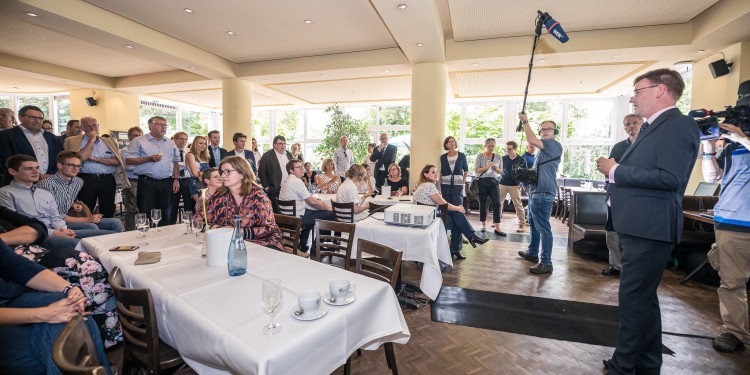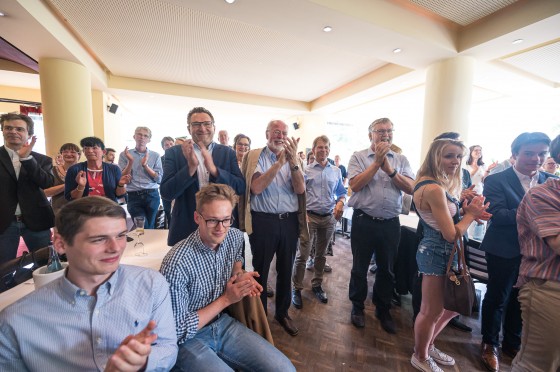
University of Münster out of the race for the title of "University of Excellence"
In the Excellence Strategy being pursued by the national and federal state governments in Germany, the decision in the second funding line has been announced. The University of Münster was not successful in the competition to be awarded the title of ‘University of Excellence’. This was announced today (July 19) in Bonn by the Excellence Commission, which consists of 39 academics as well as the national and regional state Ministers of Science and Research. “Naturally, we are disappointed because today we are already one of Germany’s strongest universities in the field of research and because, in our application, we made our potential for the future very clear,” says Prof. Johannes Wessels, Rector of the University of Münster. “But, precisely for this reason – and despite this rejection – we are determined to implement our concept, which was drawn up in an outstanding team effort. It will just take a little longer.”
17 universities and two universities consortia had made it through to the final Universities of Excellence round. Eleven of these are now officially entitled to call themselves “University of Excellence”: the Universities of Aachen, Berlin, Bonn, Dresden, Hamburg, Heidelberg, Karlsruhe, Constance, Tübingen and as well as by two institutions in Munich: Ludwig Maximilian University and the Technical University. Four Berlin universities (Humboldt University, the Free University, the Technical University) have applied as a consortium.
The German national and federal state governments will be providing these universities with around 148 million euros annually, with the funding set to begin on 1 November 2019. Besides the University of Münster, the universities which were not successful were the Universities of Bochum, Braunschweig, Freiburg, Hamburg, Kiel, Cologne, Constance and Stuttgart and as well Hanover’s Leibniz University and Medical School which had applied as a consortium.
The primary aim of this funding is to strengthen the universities, either as individual institutions or as consortia, and to support them in building on the leading position they have internationally in research on the basis of successful Clusters of Excellence.
“I would like to congratulate and pay my greatest respect to the selected universities and the Berlin University Alliance,” WR-chairwoman Prof. Martina Brockmeier commented. “The selected universities have very impressively demonstrated how universities of the future could look like. In order to compete with the top institutions on the international level, a university requires a very strong foundation in excellent research as well as a clear sense of its institutional profile and sound plans for its institutional development. The selected universities have all demonstrated very convincingly that they are in an excellent position with respect to all of these aspects”.

Future projects:
Despite the rejection announced today, the University is implementing several projects from its ‘excellence integrated’ application. To enhance its international reputation, renowned guest academics from home and abroad are to be invited to the University, and, parallel to this, the University will pay special attention to recruiting junior researchers. In addition, the collaboration between the fields of research, teaching, transfer and research infrastructures will be expanded in the coming years. For example, with an ‘Ideas Laboratory’ – a mechanism designed to help in selecting in advance relevant research topics to be carried out by researchers at all stages of their careers. The primary aim here is to leverage creative potential. With a ‘Research Center for Digital Humanities’, Münster University aims to strengthen digital structural changes taking place in the Humanities – by a process of pooling in a cross-disciplinary grouping of interests as well as by means of a high-performance service infrastructure.
As far as teaching is concerned, the principle of research-based learning will play an even more important part. Students are to be involved at an early stage in all phases of research in their own particular discipline. One specific measure is innovative teaching formats which support discussions in teaching on top-level research – for example, in the form of student congresses, science slams and round-table discussions.
Finally, in the so-called TransferRAUM the idea is to continue strengthening the bridge between research, teaching and transfer. This is because, for the University of Münster, “transfer” means taking responsibility in society by having its academics and scientists taking part in collaboration with non-university people and groups. This includes, among other things, the traditional forms of research transfer, for example anything from providing technologies and patents to starting up companies. For Münster University, transfer is also based on modern science communication, aiming at extensive dialogue with the public. Among the concrete measures are the permanent commitment of teachers to the university, who are specifically trained and educated with a view to the current state of research, the intensive use of University’s Studiobühne and the four University museums as a concrete space for exchange and debate as well as the installation of a "Münster Summit" as part of the award of the International Peace of Westphalia Prize with top-ranking guests.
Background details:
The Excellence Strategy is the continuation of the Excellence Initiative set up in 2005. Both competitions serve to strengthen top-level research at universities in Germany. The programme consists of two funding lines: Clusters of Excellence and Universities of Excellence. Currently, 57 Clusters are being funded, at 34 universities, to the tune of 385 million euros annually. Those universities which had acquired two Clusters of Excellence were entitled to submit an application, by 10 December 2018, to be classified as a ‘University of Excellence’ in the second funding line.
